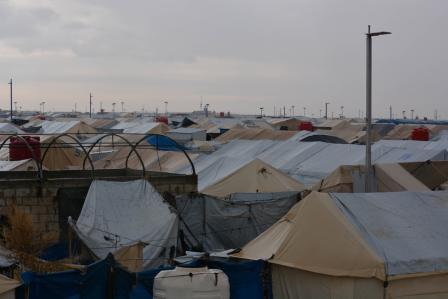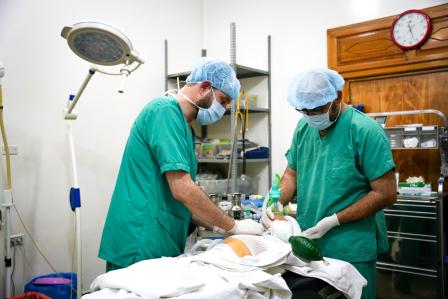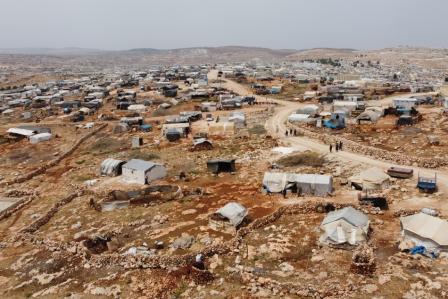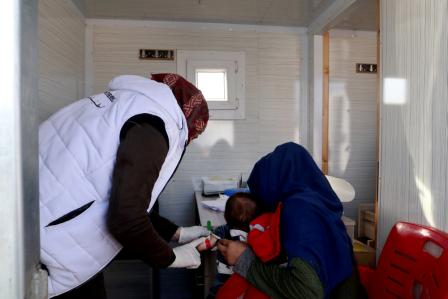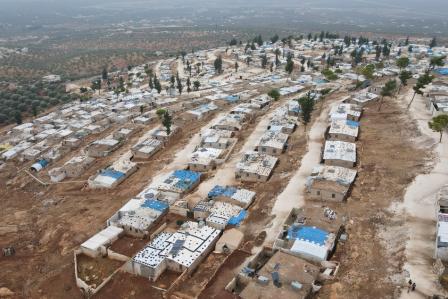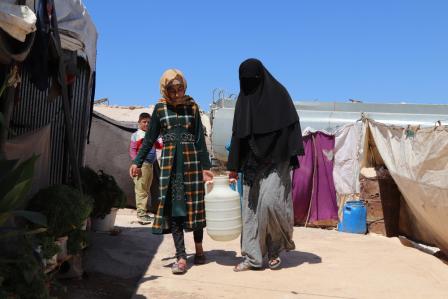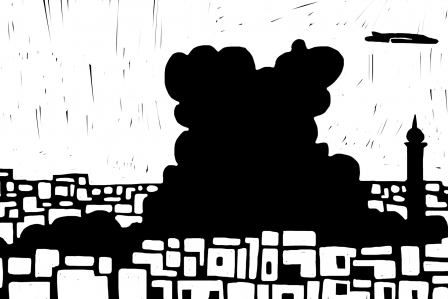Millions of people rely on humanitarian aid to survive
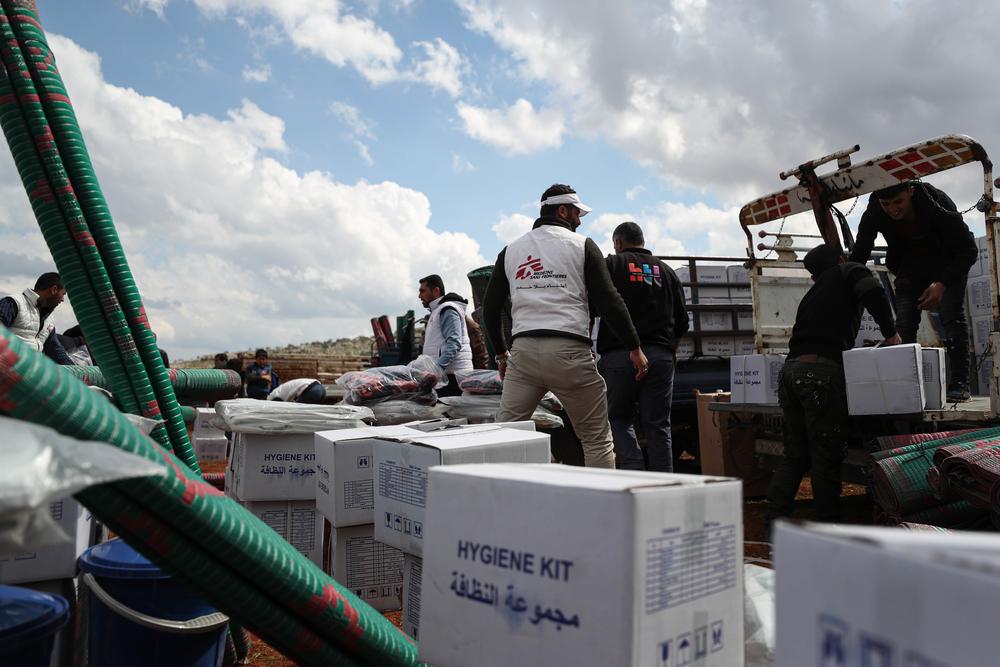
A Doctors Without Borders team distributed essential items such as blanket and hygiene kits in a camp for internally displaced people in Northwest Syria
Muhammad Hassan and his family were displaced to a camp in northwest Syria when their house was destroyed by intense bombing in 2019. Muhammad was severely injured in the leg, forcing him to undergo a difficult surgery requiring the insertion of metal plates in his thigh. This has left him with chronic pain, as well as psychological scars that can only be treated by securing his most basic needs. But this seems almost impossible to achieve in the conditions in which he now lives.
“Our life in the camp is one of worry, anguish, and pain,” he says. “We suffer from the cold in winter and the extreme heat in the summer”. Muhammad is originally a farmer. The land was his source of livelihood, and in losing it, he lost the basic means of survival. Today he relies entirely on humanitarian aid. For the treatment of his leg, he goes to a hospital co-managed by Doctors Without Borders/Médecins Sans Frontières (MSF), where he can get free medical care.
Muhammad is one of around 4 million people living in northwest Syria. Of that number, the UN estimates that at least 3 million require some form of humanitarian aid. The 10 years of conflict, the COVID-19 pandemic and a severe economic crisis have further aggravated people’s vulnerability and their reliance on humanitarian aid in the region.
2.7 million are internally displaced and more than half of them live in camps run by humanitarian organizations. Most of them are fully reliant on humanitarian assistance to survive. Many are suffering from poor living conditions, and a lack of mental health support and access to medical services such as vaccinations. It is common to see people suffering from skin conditions such as scabies or leishmaniasis, or medical conditions such as diabetes and other chronic diseases.
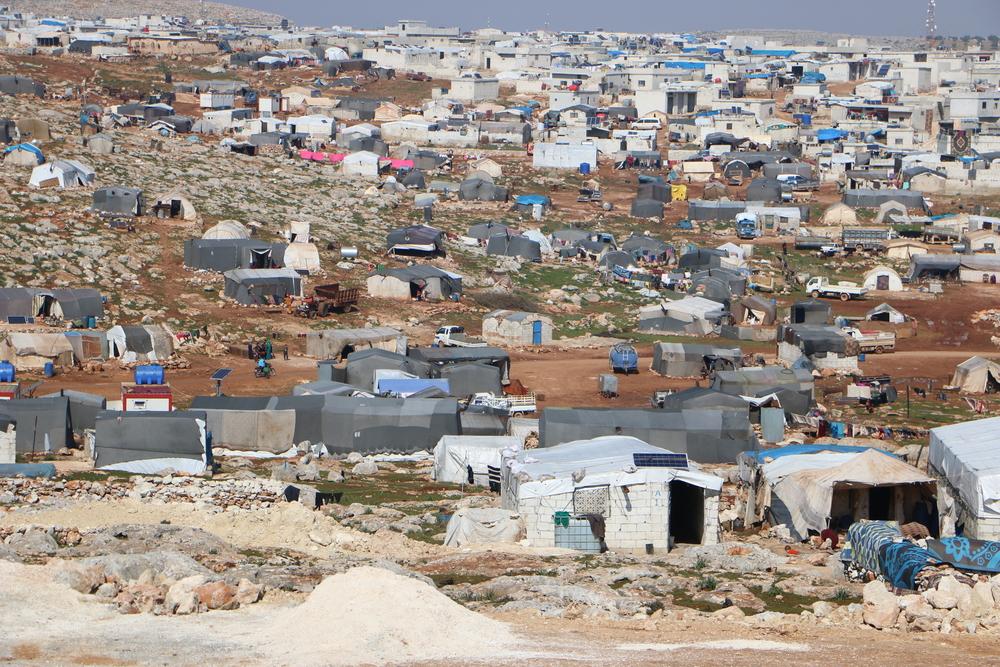
General view of Deir Hassan overcrowded camp, which houses with 120 000 displaced people, living conditions are dire as there is a severe lack of basic services with the influx of internally displaced people.
Across northwest Syria, Doctors Without Borders works to provide high-quality medical care, free of charge, both inside and outside the camps. Our services ranges from trauma and wound care, to maternal and child health services, as well as vaccination campaigns aimed at preventing the spread of deadly diseases. MSF currently supports eight hospitals, including a burns unit and 12 primary medical care centers, 5 referral ambulances and 14 mobile clinics in more than 80 camps.
“It might seem like humanitarian organizations are already providing a lot,” says Francisco Otero y Villar, Doctors Without Borders Head of Mission for Syria, “but the needs remain tremendous."
Millions of people rely on humanitarian aid to survive in northwest Syria, and everywhere we look there’s a feeling that there is still more to be done to help people. But this is very challenging. The ongoing insecurity as well as access and supply constraints severely limit MSF’s and other actors’ ability to provide this desperately needed humanitarian assistance.”
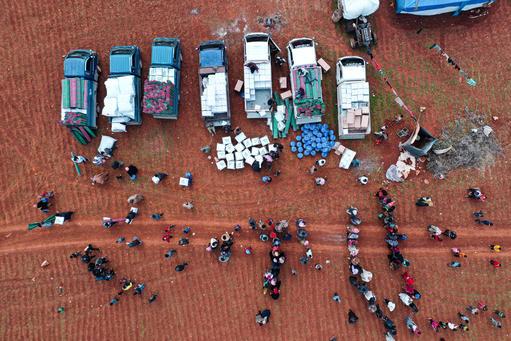
Lorries filled with essential items such as blanket and hygiene kits in a camp for internally displaced people in Northwest Syria.
In another camp in northwest Syria, Omar Sarhan, a displaced person, suffers from diabetes and hemiplegia. He cannot move his hand or leg and needs the help of his relatives to move around. Omar cannot work and relies completely on humanitarian aid as well. "I was displaced from my village a year ago and sought refuge in this camp, where we live a really difficult life. The food we receive is very scarce, and sanitation is not good enough,” he explains.
One of the basic things that hinders Omar most is his ability to go to the toilet. In the camp, the latrines are far from the tents and shared by all those who are in the camp, and the way to it is rough and unpaved - especially difficult for someone in a wheelchair. As well as its medical activities, MSF also runs water, sanitation and hygiene services in around 90 camps for displaced people in northwest Syria. The organization distributes hygiene kits (composed of soap, towels, sanitary products), builds latrines and toilets, improves sanitation, manages waste collection and supplies water tanks.
In June 2021 alone, Doctors Without Borders distributed 6,000 hygiene kits in 60 camps, and around 29000 cubic meters of water to more than 30,000 displaced people. MSF teams also built 100 latrines and distributed 240 latrines chairs for the elderly and disabled in 17 camps.
“The activity of many humanitarian organizations has decreased lately, namely in Water, Sanitation & Hygiene (WASH) services and food baskets and hygiene kits distribution, so we tried to fill the gaps with this campaign”, says Osama Joukhadar, Doctors Without Borders’s Logistics Manager. “But what we are suffering from is the increase of needs and the lack of resources in northwest Syria, and this will only get worse if Bab al-Hawa the last border-crossing point into this area gets closed."
People in northwest Syria are now dreading the 10th July 2021, which is when the United Nations Security Council (UNSC) will vote and decide whether to renew the cross-border resolution (UNSCR 2533) for the provision of humanitarian aid into the area.
"The potential closure of the Bab al-Hawa crossing point is a concern for many people here, especially for the people in the camps. If this crossing point were to be closed, it would cut off the lifeline providing people with aid,” Osama says. “All our activities, as well as the overall humanitarian response in the region would be compromised, and it would only make the situation more alarming than it already is.”
